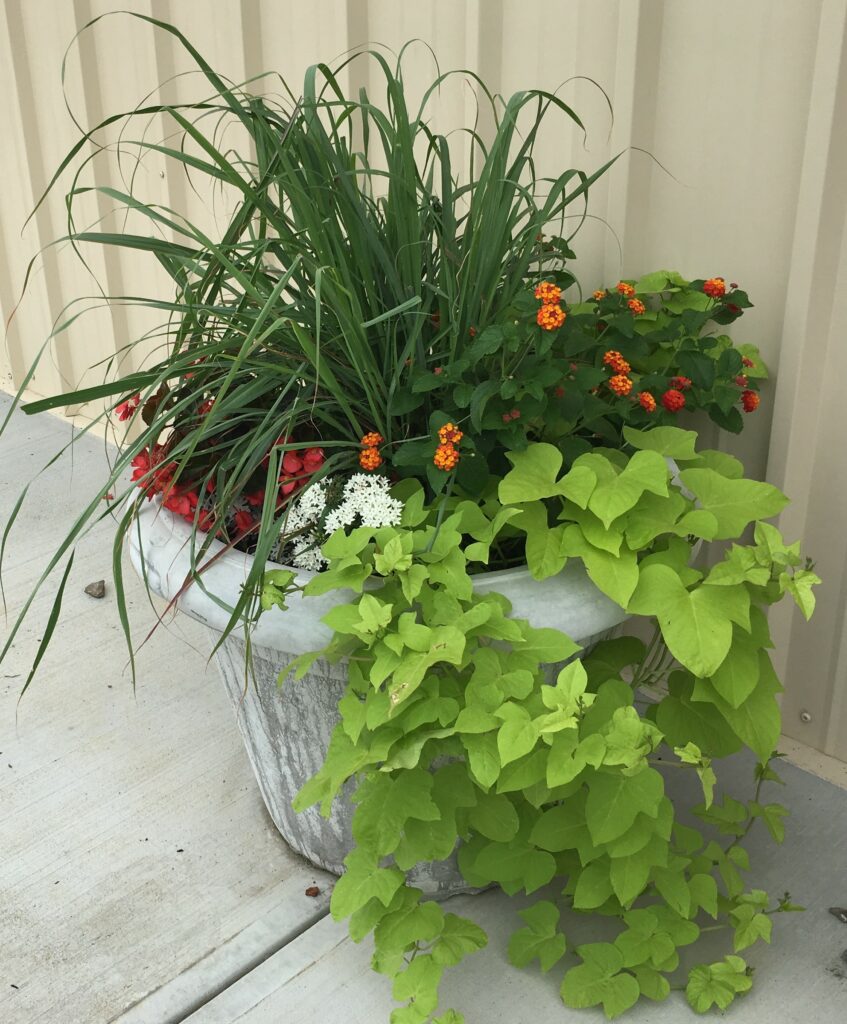July Gardening Tips
go.ncsu.edu/readext?803725
en Español / em Português
El inglés es el idioma de control de esta página. En la medida en que haya algún conflicto entre la traducción al inglés y la traducción, el inglés prevalece.
Al hacer clic en el enlace de traducción se activa un servicio de traducción gratuito para convertir la página al español. Al igual que con cualquier traducción por Internet, la conversión no es sensible al contexto y puede que no traduzca el texto en su significado original. NC State Extension no garantiza la exactitud del texto traducido. Por favor, tenga en cuenta que algunas aplicaciones y/o servicios pueden no funcionar como se espera cuando se traducen.
Português
Inglês é o idioma de controle desta página. Na medida que haja algum conflito entre o texto original em Inglês e a tradução, o Inglês prevalece.
Ao clicar no link de tradução, um serviço gratuito de tradução será ativado para converter a página para o Português. Como em qualquer tradução pela internet, a conversão não é sensivel ao contexto e pode não ocorrer a tradução para o significado orginal. O serviço de Extensão da Carolina do Norte (NC State Extension) não garante a exatidão do texto traduzido. Por favor, observe que algumas funções ou serviços podem não funcionar como esperado após a tradução.
English
English is the controlling language of this page. To the extent there is any conflict between the English text and the translation, English controls.
Clicking on the translation link activates a free translation service to convert the page to Spanish. As with any Internet translation, the conversion is not context-sensitive and may not translate the text to its original meaning. NC State Extension does not guarantee the accuracy of the translated text. Please note that some applications and/or services may not function as expected when translated.
Collapse ▲Lawn
- Recycle your clippings as you mow instead of bagging and discarding them. Returning these clippings to the law saves time, energy and money. Grass clippings contain 4% nitrogen, 1% phosphorous, 3% potassium and smaller amounts of other essential nutrients
- Try to change direction when mowing your lawn. This will help strengthen the roots system and expose different sides of the plant to sunlight.
- Fertilize bermudagrass and St. Augustine lawns at a rate of 1 lb. nitrogen per 1,000 sq. ft., equal to 6 lbs. of 16-4-8 per 1,000 sq. ft
- Install a rain sensor to your irrigation system to avoid watering during or immediately after rain. Adjust irrigation applications according to rainfall, so that a total of 1″ of water is applied each week.
Trees, Shrubs, and Flowers
- Pinch off garden mums till mid-July to encourage branches and delay flowering until fall.
- Many people have container gardens on their patios and porches. Container-grown plants can dry out quickly during these hot, summer days. Daily watering may be necessary, however, the soil shouldn’t be soggy or have standing water. Apply water until it runs out the drainage holes. Feel the soil in containers at least once a day and twice on hot, dry days to be certain that plants are getting enough water.

Container-grown plants will need to be watered daily in July to prevent drying out quickly during the hot, summer days.
- Prune spring-flowering shrubs such as azaleas, forsythia, and hydrangeas as their blooms fade. Be sure to prune them by mid-July to avoid cutting off next year’s flower buds.
- Reduce the mosquito population by emptying standing water. Mosquito larvae need only a small amount of water to grow. Empty any open container of water, including saucers under plants and birdbaths, every two or three days to prevent larvae from reaching maturity.
- Remember to prune suckers from flowering trees and shrubs like crape myrtles, crabapples, apples, pears, and more. Pruning out these suckers will improve the appearance and can reduce the chance of some diseases that are attracted to the young, succulent growth.
- A second application of slow-release fertilizer is needed in mid-summer for containers and flower beds
Fruit, Vegetables, and Herbs
- If you are growing herbs, remember to harvest before they flower for peak flavor or aroma. Pick herbs in the morning when the dew has dried off, when the aroma will be the most intense.
- When watering vegetables from overhead or with a sprinkler, the best time of day to water plants is early in the morning. Watering during mid-day allows excess water evaporation. Avoid watering in late evening when the foliage can not dry before the sunsets. Wet foliage on hot summer nights is a perfect environment for diseases to start.
- Keep tomato plants mulched and evenly moist to reduce blossom end rot and cracking.
- Certain pesticides have a waiting period of several days between the time of the last spray and harvest called “Harvest Interval Date.” Read and follow directions on all labels before applying to your vegetable crops. Wash all produce thoroughly before use.
- Pick beans, squash, and tomatoes regularly to increase production.
- Remove lower suckers on tomatoes and lightly fertilize to keep production going.
Jessica Strickland is an agriculture extension agent, specializing in horticulture for North Carolina Cooperative Extension in Wayne County.
Learn More!
- Gardening questions? Ask a Master Gardener Volunteer. The Wayne County Extension Gardener Volunteer Plant Clinic is open on Mondays and Wednesdays from 10 a.m. to 1 p.m. (April through August) to help you with your gardening questions. Contact by phone at 919-731-1433,email at master.gardener@waynegov.com or stopping by the Wayne County Extension Office at The Maxwell Regional Agricultural & Convention Center (3114B Wayne Memorial Drive, Goldsboro).
- Sign up for Wayne County Extension Gardening email list to receive timely gardening tips.
- Learn more by following us on Facebook and Instagram




